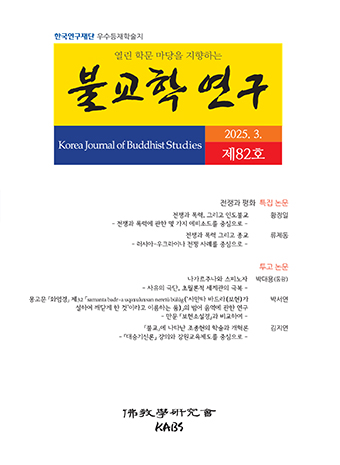Abstract
References
Sorry, not available.
Click the PDF button.
Information
Cheng-guan(澄觀, 738-839) was a Dharma successor of not just Shen-hui‘s Zen thought, but he also deeply understood the Zen of the Northern and Southern School (in particular, Zen master Hui-yun[慧雲]) and the Zen of the Oxhead School (in particular, Zen masters Hui-zhong[慧忠] and Jing-shan- fa-qin[徑山法欽]).` Based upon the "Awakening of Faith"(起信論), both Cheng-guan and Fa-zang(法藏, 643-712) understood the foundation of mind(心本) and the essence of Buddha(佛體) as being equivalent, and both emphasized the importance of mind. However, departing from the view held by previous Hua-yen Masters, they felt that the Zen School belonged in the Sudden Enlightenment School(頓敎). They said that this was because in the Zen School the fundamental truth manifested to people all at once, as contrasted with the Gradual Enlightenment School(‘漸敎) and the Perfect Enlightenment School(圓敎). The Southern School sought truth by cutting off speach, that is, through no thought(無念), non-abiding(無住), and impermanence(無相). The Northern School sought truth through detachment from thought(離念). Thus, they felt that both were teachings that emphasized sudden enlightenment. From the perspective of the Hua-yen Sutra, Cheng-guan sometimes criticized the Zen School, but he also felt that Hua-yen and Zen could be complementary. His views on this can be summerized as follows: First, Cheng-guan was apparently influenced by the Southern School of Shen-hui's understanding of "knowing"(知), which regarded it as the essence of mind. "Knowing" was considered the same as the inconceivable mind(無念心) and also the true vision of the Buddha(佛知見).Second, Cheng-guan criticized both the Southern School's understanding and the Northern School's concept of "Non-arising mind"(不起心). The Southern Schools divisions of consciousness was not true "knowing" because truth could only be obtained through "no-thought"(無念). Third, he supported the Northern School's concept of "no-thought"(無念) and criticized the Southern School's concept of "detachment from thought"(離念). He said that the latter did not thoroughly clean the dust off the mirror, but the former represented the idea of inherently pure(本來淸淨). However Cheng-guan interpreted both the Northern School's "no-thought"(無念) and the Southern School's concept of "detachment from thought"(離念) through "the essence of mind is separate from thought"(心體離念) of the "Awakening of Faith." Fourth, he felt that the Northern and Southern Schools of Zen complimented each other. Cheng-guan felt that both the Northern School's "no-thought"(無念) and the Southern School's concept of "detachment from thought"(離念) were incomplete in themselves, so he proposed a new concept, that of "not-thought"(非念). "Not-thought" was a level above discriminations and conceptualization, where understanding(智) is the first of his ten stages(十地). He also said that "not-thought" was similar to the Southern School's "no-thought," and that it had the same meaning as the Northern School's "spiritual cultivation achieves not-thought"(修得非念). Thus if a person relies upon "no-thought"(無念) and cultivates "detachment from thought"(離念) then they will achieve the state of perfectly unfettered state of no thought that is one with the fundamental principle. From this we can see the Hua-yen School's understanding of the arising of the nature(性起思想) and we can also see Cheng-guan's intention to harmonize both the Zen and Hua-yen Schools.
Click the PDF button.
- Publisher :Korean Association of Buddhist Studies
- Publisher(Ko) :불교학연구회
- Journal Title :Korean Journal of Buddhist Studies
- Journal Title(Ko) :불교학연구
- Volume : 3
- Pages :93~126


 Korean Journal of Buddhist Studies
Korean Journal of Buddhist Studies






